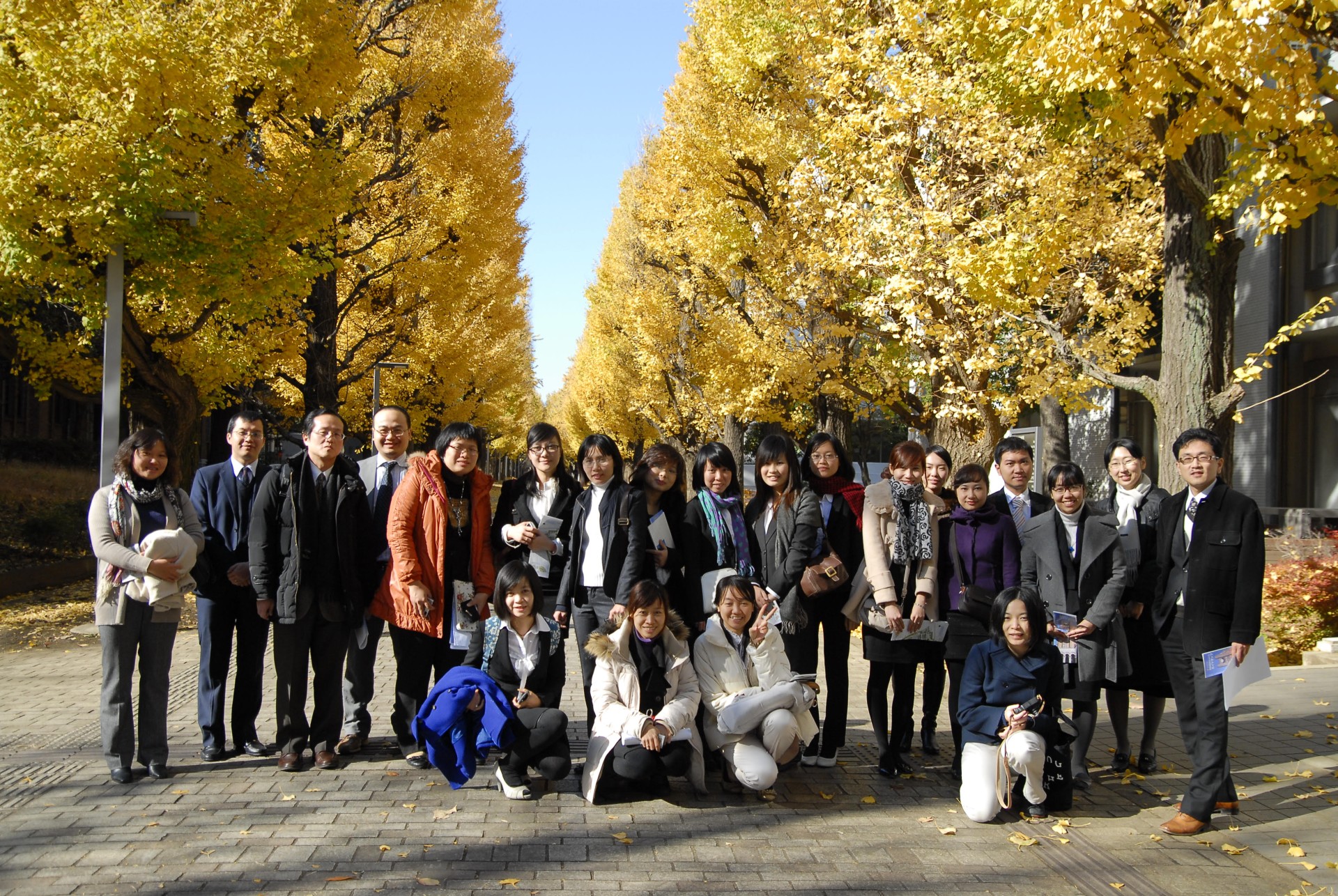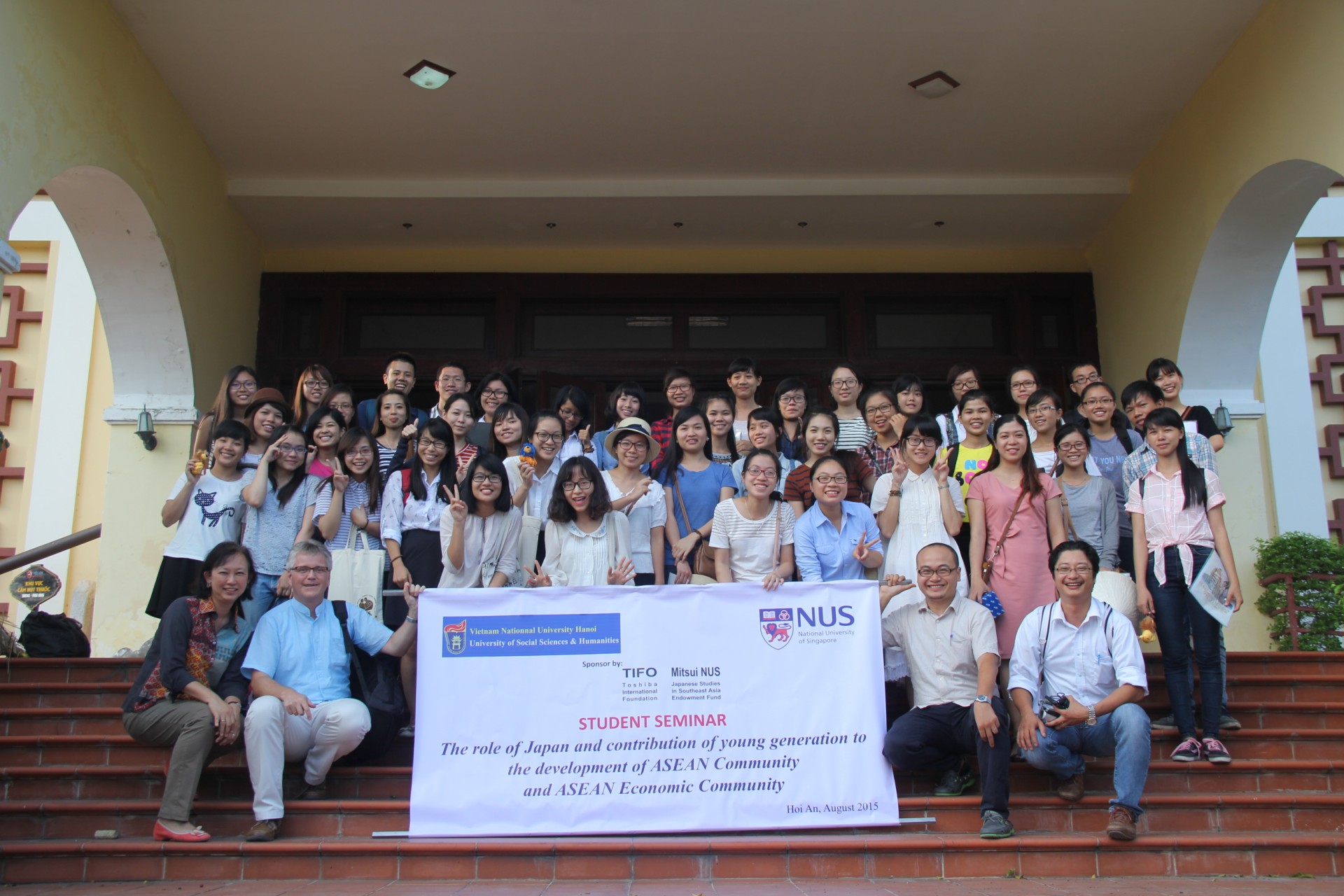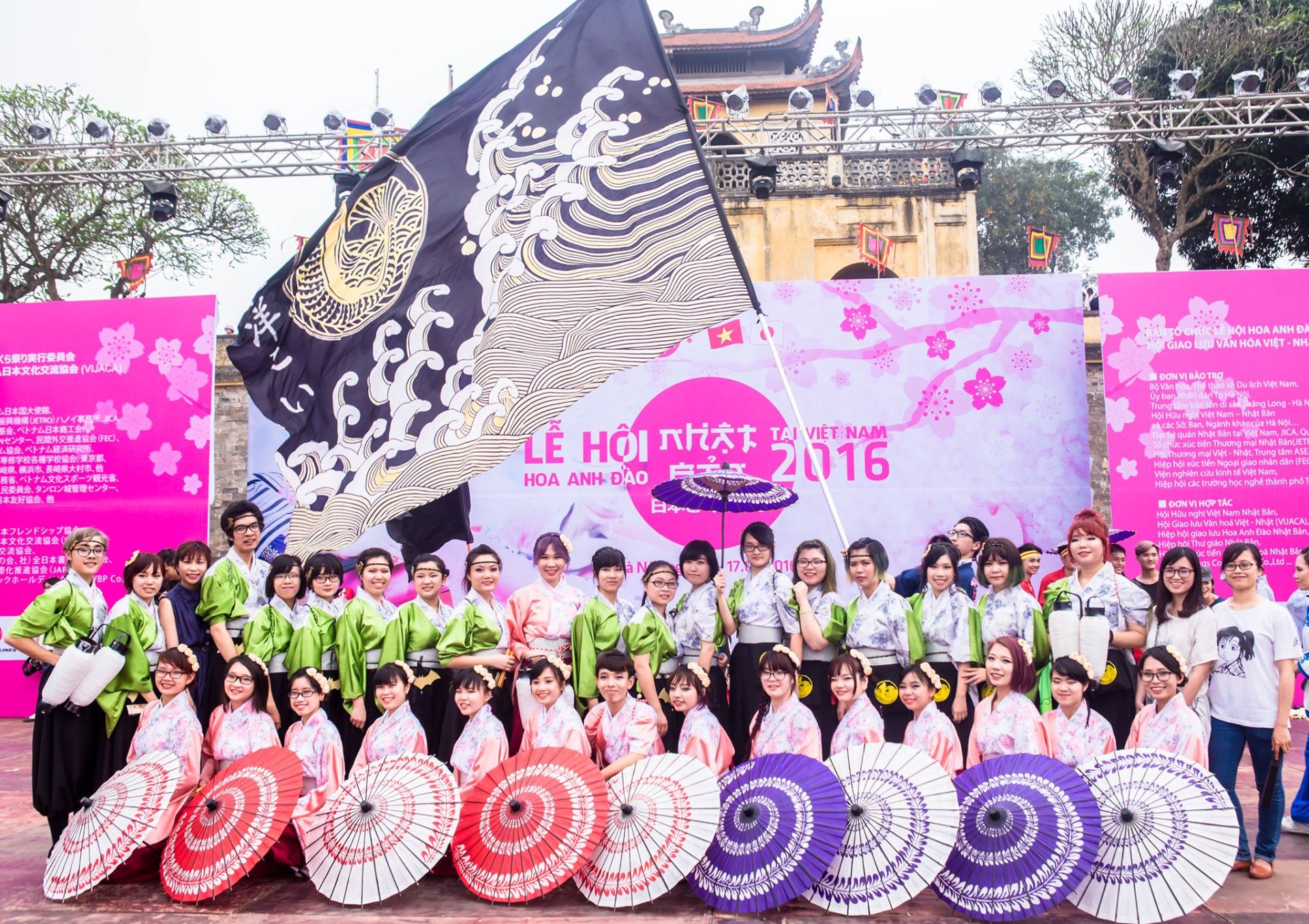Japanese Studies Hanoi – a brand that has never been out of "hot"
The Department of Japanese Studies at the University of Social Sciences and Humanities was established in 1993 (since 2019 it has become a major with its own admission code). Up to now, there have been 25 courses with more than 760 graduates. The average entrance and exit scores of students majoring in Japanese Studies are often the highest in the Faculty of Oriental Studies in particular and the University of Social Sciences and Humanities in general. There are many reasons for the attractiveness of the brand of Japanese Studies and Humanities in Hanoi.
The first,The career opportunities for students after graduating from Japanese Studies at the University of Humanities are very open. Students graduating from Japanese Studies with a broad knowledge base and good foreign language skills can find many opportunities to work and study in many fields, professions, agencies and organizations at home and abroad. You can take on the following job positions:
✔️ Translators, interpreters;
✔️Office secretary, foreign affairs assistant at Vietnamese state agencies, Vietnamese and Japanese enterprises;
✔️Consultant, marketing specialist, event organizer, commercial transaction specialist at businesses using Japanese;
✔️Announcers, media staff, editors at media agencies and publishing houses;
✔️Lecturer and/or researcher of Japanese, Japanese studies, Oriental studies at universities and research institutes.
✔️Japanese language teachers at high schools (after completing a pedagogical training course).
Thus, Japanese Studies graduates can work at agencies: Ministry of Foreign Affairs, embassies, international cooperation departments of ministries, universities teaching and researching international relations and Japanese studies at universities, research institutes, domestic news agencies, newspapers, international organizations, non-governmental organizations, Japanese enterprises in Vietnam, Vietnamese enterprises and foreign enterprises having relations with Japan, agencies, cooperation projects with Japan in education, health, culture, science, etc.
Numbers carry messages:A survey of alumni of the Department of Japanese Studies shows that more than ¾ of them are satisfied with the job opportunities and clear career orientation of the Japanese Studies major. The survey results of 5 recent graduating classes show that 86% of students have jobs immediately after graduation, 11% of students continue their studies at the postgraduate level and all choose the Japanese Studies major at the Faculty of Oriental Studies to continue their studies and scientific research at the master's and doctoral levels.
Regarding the organizational type of the recruiting unit, it is very diverse: companies with 100% foreign investment capital account for the highest proportion (38.6%), Vietnamese companies (18.6%), central and local administrative agencies (11.6%), training and research institutions (10.7%). The fact that nearly 40% of students are working for 100% Japanese-invested enterprises shows that Japanese students studying at Hanoi University of Humanities have met the very high requirements of Japanese enterprises in terms of both professional capacity and the ability to integrate into the business environment.
In addition, the survey on the general human resource demand of society for Japanese studies and the employment potential of Japanese studies bachelor's graduates of the Department also shows that: not only in Vietnam, but many establishments and units located in Japan and abroad are having high demand for human resources in Japanese studies. These are government diplomatic agencies abroad (88.2%), representative agencies of local governments abroad (80.4%), international organizations (82.4%), Vietnamese enterprises investing abroad (90.2%) and foreign enterprises (82.4%).
Graduates of Japanese studies can easily find suitable jobs with a relatively high salary, a dynamic working environment, and practice many skills. According to the results of many surveys, graduates of Japanese studies have a relatively high income (from 8 million to 25 million depending on the job position and nature of the work undertaken).
The second reason why people choose Japanese studies in Humanities, is an opportunity to study abroad, receive scholarships and exchange and learn with Japanese students, international students are very open during the time studying at the School. The rate of students receiving scholarships to study abroad of the Department (about 10-15 scholarships/year) is considered the highest among Japanese studies and Japanese language training institutions in Vietnam. In addition, during the 4 years of studying at the School, students regularly participate in exchange activities with Japanese students, foreign students in Japan, participate in extracurricular activities to practice research, fieldwork, experience Japanese culture (tea ceremony, swordsmanship, flower ceremony ...). Being able to visit, study, exchange, intern, practice, and receive scholarships to study abroad in the beautiful country of Japan right from studying at the school is not too difficult when you become a student of the Japanese Studies major at the School of Humanities.

Japanese language students studying at the University of Social Sciences and Humanities do internship in Japan
Tuesday, Japanese Humanities - a professional, modern training environment with its own identity
Since its establishment, the Department of Japanese Studies, Faculty of Oriental Studies, University of Social Sciences and Humanities has been the leading, pioneering and prestigious training unit in Vietnam in Japanese Studies. This is thanks to the orientation of training Japanese Studies in depth and with its own identity.
Right from the beginning, the founders of the Department of Japanese Studies at the University of Social Sciences and Humanities, Hanoi, soon realized the need to further train a high-quality workforce with a comprehensive and profound understanding of the country, culture and people of Japan. Such a workforce can meet the needs of government agencies that need experts and consultants in relations with Japan; the needs of Japanese enterprises in Vietnam, Vietnamese enterprises and international organizations with relations with Japan that need a workforce capable of working long-term with Japanese people, understanding Japanese culture, personality and lifestyle. In addition, young Vietnamese people who are passionate about Japanese popular culture (Pop Culture, including comics, anime, Harajuku fashion, etc.) and want to improve their professional capacity, skills and working style according to Japanese standards also have the need to study Japan systematically.

Assoc. Prof. Dr. Phan Hai Linh (Former Head of the Department of Japanese Studies) shared: “The Department’s research and training in Japanese studies is based on an interdisciplinary and regional approach. The goal of the Japanese studies training program is not only to train experts who can use Japanese fluently, have a solid grasp of comprehensive knowledge about Japan, and Japanese research skills; but also to be able to update the changes of modern Japan, grasp advanced schools of Japanese studies, and access research and training achievements in Japanese studies in the region and the world”. This is different from most other training institutions that only focus on Japanese language and culture, or combine Japanese training with a certain career direction such as Japanese for information technology, Japanese for business, etc.
Based on the orientation of training subjects and output standards closely following social needs, the Japanese Studies training program is increasingly perfected with 3 main knowledge blocks: Basic knowledge of Social Sciences and Humanities; General knowledge of majors related to Area Studies, Oriental Studies, Northeast Asian Studies; Specialized knowledge of Japanese Studies. The strength of the Japanese Studies training program at the University of Social Sciences and Humanities is the combination of theory and skills, between lectures and discussions, and practical internships, helping students to cultivate comprehensive and systematic knowledge of Japanese Studies, meeting both research orientation and application and practice capabilities.
Studying Japanese at the Humanities gives you the opportunity to study and conduct scientific research at an international level.
- Since 2006, the Department of Japanese Studies has been recognized by the Embassy of Japan and the Japan Foundation as a key agency for training and researching Japanese in Vietnam. Since then, many projects and programs for developing the industry have been implemented: Program for sending students and lecturers for internships, Program for compiling books and teaching materials, and many research works on Japan.
- Exchange and academic exchanges with leading universities in Japan: Tokyo University, Kyoto University, Osaka University, Tokyo University of Foreign Studies, Tokyo Gakugei University, Nara Women's University, Senshu University, Showa Women's University... Through this, students can directly attend lectures on Japanese studies by Japanese and foreign professors; scholarships for study and scientific research, and opportunities for practical internships in Japan.

- On the basis of establishing cooperative relationships with universities with Japanese studies majors in Southeast Asia and East Asia: In 2016, the Department's representative became an official member of the Executive Board of the Japan Studies Association of Southeast Asia (JSA). Especially with the support of the Toshiba International Foundation, since 2018, the Department of Japanese Studies has begun to establish an academic exchange network with leading universities in Japanese studies such as Aix Marseille University (AMU) of France, Cambridge University of the UK, Heidelberg University of Germany, UCLA University, UC Berkeley of the US, UBC of Canada...
Therefore, becoming a student of Japanese Studies at the Faculty of Humanities, you will have the opportunity to exchange, learn, study and research at many leading universities in the region and the world.

Japanese language students exchange with National University of Singapore in 2015
Associate Professor Dr. Phan Hai Linh shared: “Based on the close cooperative relationship with universities in Japan, Asia, Europe, America, etc., the Department of Japanese Studies is gradually expanding its cooperative relationship beyond the Asian region with the desire to build a Japanese Studies major in Vietnam of international standards.”
With strong development and meeting the needs of society, since 2019, Japanese Studies has become a training major with its own admission code. This helps promote the realization of the internationalization of training and research in Japanese Studies; at the same time, it opens up many new opportunities for young people who love to learn and explore the country, culture and people of Japan, want to become ambassadors to spread Vietnamese culture to the world and bring world culture to Vietnam.

Japanese Studies students participate in the Cherry Blossom Festival (one of the cultural exchange activities between Vietnam and Japan)
1. Major name: Japanese studies
2. Industry code: QHX12
3. Training unit: Faculty of Oriental Studies
4. Target 2022: 50
5. Exam blocks: D01, D06, D78
|





